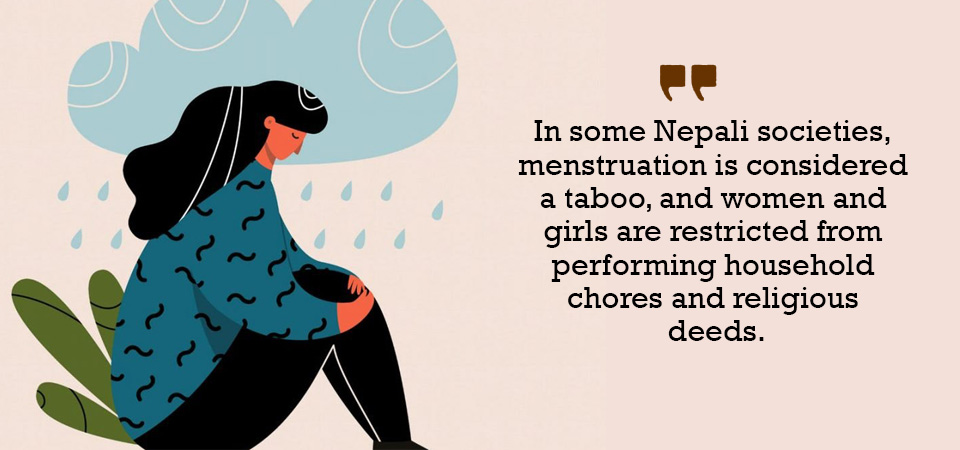Social beliefs on menstruation take tolls on youths’ mental health

Smita Adhikari
Pokhara, Sept. 23: Owing to the hassle of managing periods, tension starts building up for 14-year-old Dipika Bhandari of Pokhara Metropolitan City-14 during the end of every month. This has been a recurring problem for Bhandari since a year ago when she reached menarche.
Not being allowed to have meals together with family members while menstruating bothers her the most. "Not only this, my mom has provided me with a long list of dos and don'ts during the periods which I need to follow strictly," said Bhandari.
Curious to know the rationale behind restrictions during periods, Bhandari frequently enters into discussions with her mother, asking the latter about the reason why girls aren't allowed to eat together with the family, sleep in her regular bed or even enter the kitchen during menstruation.
Bhandari is just an example. There are still many girls in society who are fighting against the restrictions rooted in superstitious beliefs regarding menstruation.
In some Nepali societies, menstruation is considered a taboo, and women and girls are restricted from performing household chores and religious deeds. The reason behind period restrictions is linked with religion and traditional norms and values that a majority of people in our society have been following forever.
These restrictions have become a great burden to the young girls and women of this generation. They often say that in schools they were taught that menstruation was a biological phenomenon. But the social beliefs and practices at home regarding menstruation were contradictory to what they were taught in schools.
However, 16-year-old Sabina Sapkota of Pokhara-31 Begnastaal has a different story to share. One afternoon while she was alone at home during her period, she for the first time violated the restrictions imposed upon her. She was preparing for her SEE exam and was habituated to drink more water and snack on fruits while preparing for the exam.
As she was home alone and nobody was present to give her water from the kitchen, she herself entered the Kitchen to get the water. Her mom suddenly showed up at the same time. "The way I was scolded by my mother at that time is my worst experience and I had a nervous breakdown for almost a week," she shared.
"Biologically, a female body seeks care, hygiene, and adequate rest during the periods, pregnancy and post-partum stage. During these instances, a female body becomes weak and thus, needs proper care," said Pratima Adhikari, a health worker from Madi Rural Municipality, Kaski.
The period restrictions might have come into existence with a view to letting women have rest during menstruation. "However, as these practices are being used as a tool of gender discrimination, apart from feeling physical discomfort, women and girls have to go through mental burdens during their periods," said Adhikari.
Jamuna Poudel, 30, of Madi-6 has had an unpleasant experience while giving birth because of the outdated practice of child delivery. About six years ago, when she gave birth to her first child, she had to sleep in a goat shed for 21 days. She struggled to have a sound sleep for 21 days.
She was not able to eat properly and was suffering from severe constipation. She avoided eating meat due to the fear that the stitches of the operation would come off. “I had only Thyme (Jwano) soup and rice in the name of food," she said.
On top of that, the mother-in-law used to say that the clothes stained with the mother's blood would bring bad luck to the family.
She went through unbearable mental pressure after the delivery. "Due to the lack of nutritious food, she could not even breastfeed her child properly, adding to the stress.
"This bitter experience and treatment from my in-laws compelled me to stay separate and I have been staying alone with my children," Poudel shared.
In order to prevent a serious impact on the physical and mental health of women in the wake of a natural process like menstruation and childbirth, various programs like distribution of sanitary pads, adolescence education program, public awareness interaction, and orientation have been conducted at local levels for the past few years.
In these programs, the experiences shared by health workers revealed that many women do not stop imposing restrictions on their daughters or daughters-in-law due to the fear of social exclusion.
"This indicates that the community still needs to seek adequate orientation and awareness on issues of menstrual or maternity health," said Adhikari, who is also the chief of Taprang Health Office of Madi Rural Municipality.
According to Sabina Shrestha, head of the Women and Adolescent Program under the Pokhara Metropolitan Health Division, about 4 percent of the women in the health camps run by the Pokhara Metropolitan City are found to suffer from uterine swelling and are VIA positive. "This shows that even in urban areas, women still do not get proper care and food during menstruation and childbirth," she said.
Recent News

Do not make expressions casting dout on election: EC
14 Apr, 2022
CM Bhatta says may New Year 2079 BS inspire positive thinking
14 Apr, 2022
Three new cases, 44 recoveries in 24 hours
14 Apr, 2022
689 climbers of 84 teams so far acquire permits for climbing various peaks this spring season
14 Apr, 2022
How the rising cost of living crisis is impacting Nepal
14 Apr, 2022
US military confirms an interstellar meteor collided with Earth
14 Apr, 2022
Valneva Covid vaccine approved for use in UK
14 Apr, 2022
Chair Prachanda highlights need of unity among Maoist, Communist forces
14 Apr, 2022
Ranbir Kapoor and Alia Bhatt: Bollywood toasts star couple on wedding
14 Apr, 2022
President Bhandari confers decorations (Photo Feature)
14 Apr, 2022










